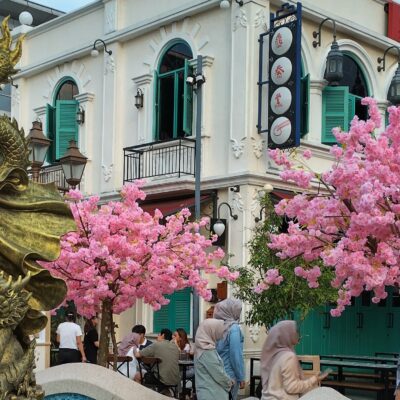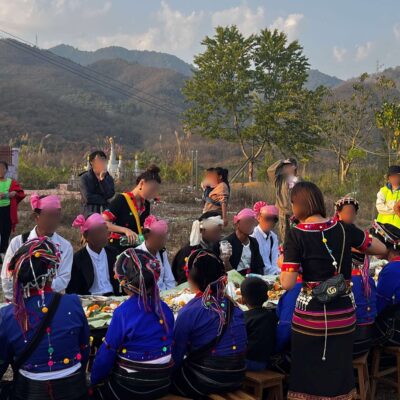Vanuatu, like many of its Pacific Island neighbours, has experienced increasing Chinese influence over the last decade, marked by enhanced diplomatic, economic, cultural, and infrastructure ties. In Vanuatu, this has been particularly evident through China’s Belt and Road Initiative and the granting of citizenship to foreign investors through financial contributions, which have created new opportunities for Chinese investment. However, this surge in investment has also intensified conflicts over land use rights and ownership between Chinese investors and customary landowners, who hold rights to land under customary law (kastom).
This article draws on a review of relevant court cases and as well as interviews with Chinese investors to explore their experiences and perspectives, aiming to better understand the complexities of disputes over customary land in Vanuatu. It focuses specifically on the narratives of Chinese investors—an underexplored aspect of land disputes in the region. We hope that future research will delve deeper into Indigenous perspectives to further enrich understanding of the disputes involved.
We argue that Vanuatu’s hybrid land tenure system, a colonial legacy of the Anglo-French administration that merges customary practices (such as oral agreements) and formal legal frameworks, presents significant challenges for Chinese investors engaging in customary land investment. While Chinese investors arrive with varied expectations and ideas about land, their interactions with the system often result in land disputes and social conflicts due to unfamiliarity with local customs and traditions, as well as differing perceptions of land ownership.
The customary land tenure system in Vanuatu
Vanuatu is located between Fiji and New Caledonia in the Southwest Pacific Ocean, consisting of 82 islands with a population of about 300,000 people. Port Vila, the capital city, comprises approximately 16 percent of the national population (according to official statistics, although there are higher estimates) and is experiencing an influx of migrants from other islands.
From 1906 until it gained independence in 1980, the country was jointly governed by Britain and France as a colonial condominium known as the New Hebrides. During the colonial period, large portions of customary land were alienated from the ni-Vanuatu, the indigenous people of Vanuatu, by colonial authorities, missionaries, and settlers. After independence, the country was renamed Vanuatu, meaning “Our Land Forever”, reflecting the significance of land as a link between the past and future for its people.
In response to the land dispossession, the Constitution of Vanuatu declares that all land belongs to its indigenous customary owners and their descendants (Article 73). It further specifies that customary law serves as the basis for land ownership and use (Article 74), and only indigenous citizens can own land in perpetuity (Article 75). These provisions provide the legal basis for customary law and practices to govern land tenure in Vanuatu.
The country operates under a hybrid legal system that incorporates customary law and formal property systems within the framework of the Constitution. Under the Land Reform Order No. 26 of 1981, the municipal boundaries of Port Vila and Luganville were demarcated, classifying these areas as public land owned by the state, while peri-urban areas beyond the municipal boundary of Port Vila remain under customary ownership. The recent rapid growth has led to the expansion of urban areas into surrounding customary lands, driven by infrastructure projects and tourism development. For instance, an estimated 80 percent of coastal land has been transferred by customary landowners to investors through long-term lease agreements.
Customary landowners have the right to lease their land to individuals or foreign investors for periods of up to 75 or 99 years, depending on mutually agreed terms in formal leasehold arrangements. The leasehold system is a legacy of colonial rule, which introduced formal land tenure and property rights concepts based on Western traditions. However, informal arrangements are often observed in the customary land tenure system, where land ownership is governed by tradition and local customs such as oral agreements and ancestral inheritance practices. These agreements lack formal documentation and are subject to varying interpretations. This hybrid legal system, derived from the intersection of formal property frameworks and customary tenure, creates legal ambiguities in tenure and an increased likelihood of land disputes and contested ownership, particularly for foreign investors who are unfamiliar with local customs and traditions.
China’s growing presence in Vanuatu
Since Vanuatu’s independence, China’s presence has steadily expanded.
Vanuatu’s recognition of the One-China policy and its stance on Taiwan further deepened its political ties with Beijing. The country’s participation in China’s Belt and Road Initiative since 2018 has signalled a new phase of strategic collaboration, further strengthening bilateral cooperation across various sectors, including infrastructure development, trade, low-carbon initiatives, agriculture and fisheries. The 2019 Cooperation Plan and the 2024 Joint Statement have reiterated their strategic partnership. Between 2019 and 2024, Vanuatu’s trade with China expanded significantly, with the total trade volume more than doubling from approximately USD 80.35 million in 2020 to USD 206.16 million in 2024, reflecting increasing economic engagement between the two countries.
In recent years, China has become actively involved in constructing major infrastructure projects in Vanuatu, including the new Presidential Palace, government buildings for key ministries (the Ministry of Finance and the Ministry of Foreign Affairs), and the National Convention Centre. However, controversy has emerged over Vanuatu’s acceptance of large China-aided projects. In particular, the quality of Chinese buildings was criticised following a major earthquake in December 2024, during which the collapse of Chinese-built buildings raised concerns about construction quality and safety. Further, while some view Chinese aid and investment as beneficial for community development, others express concerns over community displacement, lack of financial transparency, debt traps, and the broader geopolitical implication of China’s influence. Meanwhile, although China’s BRI project has contributed to infrastructure development, it has not supported capacity building within the government to develop a strategic planning framework to guide the city’s growth.
Despite these controversies, Chinese businesses continue to be attracted to Vanuatu and the Chinese diaspora is growing. A factor driving the migration is Vanuatu’s Citizenship by Investment Scheme, also known as the “passport-for-sale” scheme, which was introduced in 2016 and grants foreign investors citizenship through financial contributions. The Overseas Chinese Association of Vanuatu estimates that there are approximately 3,000 Chinese residents in the country, including those in short-term employment and long-term settlers (Interview data, 2024).
Studying land disputes involving Chinese investment
We examined land disputes between Chinese investors and customary landowners in Vanuatu through a review of legal cases and in-depth interviews. To analyse legal conflicts, relevant court cases were collected by using the Pacific Islands Legal Information Institute (PacLii) database, which is a repository of legal documents in the Pacific region. While this database may not capture all court cases, it provides a valuable platform for identifying and understanding existing legal disputes related to Chinese investment.
Cases were identified by searching the database using the keyword “Land Leases Act”, as the Act serves as a key law frequently cited in land dispute cases. The search was narrowed to the past decade and yielded 250 cases. These cases were then reviewed based on screening criteria, including the presence of Chinese surnames and references to ‘lease title number 12’, which pertains to customary land. After applying these criteria, a total of eight court cases were identified as relevant land disputes between Chinese investors and customary landowners and were selected for further analysis.
In addition to the review of court cases, fieldwork was conducted in Port Vila in November 2024 to gain insight into the perspectives of Chinese investors engaged in land transactions. We reached out to potential participants by visiting rural villages, Chinese-owned stores, and resorts operated by Chinese investors located on customary land. Many were reluctant to share their experiences of land transactions, viewing the matter as highly sensitive and expressing concerns over privacy, identity disclosure, and potential repercussions.
Despite these challenges, eight semi-structured interviews were successfully conducted, offering limited but valuable perspectives. Among the participants, five had experience investing in customary land; and four had entered into long-term lease agreements with customary landowners to secure land for commercial activities, such as resorts or industrial sites. The fifth participant was a Chinese store owner who rented retail space from another Chinese investor holding a lease on customary land. Two participants had purchased land located within municipal areas for residential and resort development purposes. Additionally, one participant was a real estate agent involved in facilitating land transactions.
Why do Chinese investors choose Vanuatu?
Interviewees were motivated to come to Vanuatu by factors such as economic opportunities, family ties, lifestyle preferences, work commitments, and aspirations to contribute to local development.
Some interviewees purchased customary land for storage and future development, while others were attracted to its economic potential for tourism or industrial activities that could not be accommodated in urban areas. Some investors were primarily attracted to its lower cost.
Meanwhile, several challenges deter investors from purchasing customary land. Two participants who invested in urban land expressed concerns about remoteness, low land values, and additional costs due to underdeveloped infrastructure. One interviewee emphasised that he avoided purchasing customary land due to the complexities involved in dealing with indigenous landowners, as further discussed in the following sections.
Disputes over customary land in court
Court cases regarding customary land disputes between Chinese investors and indigenous landowners generally fall into two main categories: eviction actions (e.g., Kai v Tom [2020], Pakoa v Guan Kai [2022; Court of Appeal], Yang v Ieru [2020]) and ambiguous or contested ownership over customary land (e.g., Toro v Kiri [2016]; Mahe v Poilapa [2020]; Xourel v Poilapa [2018]; Republic of Vanuatu v Takurua [2023]).
The first type of land dispute arises from eviction claims sought by Chinese investors after purchasing land occupied by local residents who often lack formal leases but claim rights based on customary or informal arrangements. In these cases, Chinese investors act as claimants, holding formally registered leases as bona fide purchasers and seeking legal eviction through the courts. For instance, in Guan Kai v To [2022], a Chinese investor was involved in a land dispute with ni-Vanuatu after purchasing a leasehold title that was subject to an inheritance conflict between brothers. Further complicating the matter, oral agreements were made with 10 families granting them permission to reside on the land. These families claimed rights under Section 17(g) of the Land Leases Act, citing oral agreements and long-term residence. The investor pursued legal action to request an eviction order. Similarly, in Yang v Ieru [2020], a Chinese investor sought to evict an occupant who had resided on the land for over two decades under an informal caretaker arrangement. In both cases, the courts ruled in favour of Chinese investors, considering their legal entitlement to the land as the registered proprietor of the leases and in the absence of verifiable consent from the customary landowners.
The second type involves disputes where Chinese investors are positioned as respondents in cases where they purchased land subject to ambiguous or contested customary ownership. In these cases, the issue is not the occupation of the land but rather the legitimacy of the lease, often involving claims of unauthorised lease transfers or misconduct by officials. For instance, in Toro v Kiri [2016], the unclear customary land ownership arose from the unlawful registration of leases by the Minister of Lands without the consent of the customary landowner. The court ruled in favour of the customary landowner by compensating VT 45 million (approximately USD 370 thousand), while also recognising the Chinese investor as a bona fide purchaser. Another example is Mahe v Poilapa [2020], where a Chinese investor purchased a lease that was challenged by another family who had been living on the land for over 80 years and claimed that the lease had been granted without their consent.
The review of these court cases reveals that disputes over customary land between Chinese investors and customary landowners in Vanuatu revolve around competing claims between formal leasehold titles and customary land tenure. Chinese investors claimed their rights through registered leases as bona fide purchasers, while customary occupants often based their claim on long-term residence and verbal or informal agreements. These cases expose the underlying tension between formal property systems and customary practices, creating persistent challenges and uncertainties for foreign investors.
Interviewee perspectives
The interviewees encountered disputes over customary land ranging from trespassing to complex ownership claims and overturned agreements. In one instance, an interviewee purchased land and later discovered unresolved inheritance disputes. To prevent the land from being sold, a relative and his supporters occupied the site. The interviewee stated, “It was lucky that we had only paid a 10 percent deposit and discovered that the site was occupied. Inspection is crucial before investment to understand the actual situation of the site. We have withheld the remaining transactions until the family dispute is resolved”.
In some cases, agreements between investors and customary landowners were overturned. One interviewee described her experience of villagers rescinding the agreement, demanding additional payments, and blocking the entrance to the land. She took legal action to resolve the issue. In another case, an interviewee described his friend’s experience in which a Chinese investor purchased land and returned to China. Upon his return to Port Vila, he discovered that the customary landowner sold the same property to another investor. Another interviewee spoke of a similar situation. These cases demonstrate the uncertainty and potential risks associated with land transactions under customary tenure.
When facing these disputes, the interviewees indicated that they considered legal action as a last resort, preferring to take alternative action such as asserting their rights over the land by installing security cameras and hiring security guards for surveillance on their property. Many also attempted to resolve conflicts through negotiation. Engaging with community chiefs was regarded an effective strategy for resolving disputes with indigenous villagers. For example, one interviewee contacted a chief after villagers began a plantation on his land. After the communication initiated by the chief, the plantation was removed from his property. However, another interviewee had no choice but to pursue legal action after negotiations failed.
Conclusion
As a real estate agent noted in an interview, “Many Chinese investors arrive in the country with rosy assumptions, and some simply rely on their agents’ advice to invest. Nonetheless, they often lack sufficient preparation and familiarity with local customs and traditions. In many cases, they find themselves facing difficulties when their economic gains fall short of expectations. In the worst-case scenario, they become entangled in land disputes and suffer financial losses. It is crucial for investors to fully understand the local context before making investments”.
While Chinese investors are drawn to Vanuatu for its economic opportunities, the interplay between informal customary tenure arrangements and formal legal frameworks continues to create uncertainties and potential risks in customary land investment. Their experiences highlight the need for a deeper understanding of local customs and culturally informed approaches to conflict resolution among various stakeholders.
Authors: Dr Ka ling Cheung and A/Prof. Jennifer Day.
Further reading:
- Chinese employers in Botswana and their impact on local workers.
- China’s diaspora engagement policy and its powerful effect outside its borders.
- 中国的侨民沟通政策及其在中国境外的强大影响.
Main image: A Chinese-owned store, Efate, Port Vila. Credit: Authors, November 19, 2024.




